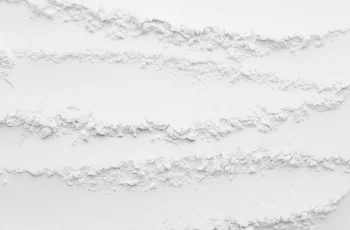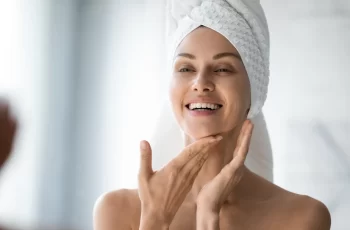
How to fight hyperpigmentation around the mouth?
Fighting hyperpigmentation can be quite daunting, but it has become much more treatable in recent years. There are a number of products with all skin ingredients that can help fight dark spots on the skin and make them look less noticeable. There are different levels of hyperpigmentation on the skin, ranging from scars left by acne to damage caused by excessive UV radiation. Some people also find that lifestyle changes can lead to uneven skin tone. While this is a harmless skin problem, it can be quite bothersome, especially when it is concentrated in the mouth area. So today we are taking a look at how to fight hyperpigmentation around the mouth.
If you want to learn how to fight dark spots on the skin, you can read our dedicated blog post on which skin care tips can help you keep them under control.
How to whiten the skin around the mouth?
We all get our skin pigment from melanin, which is naturally produced in the skin. Often, damage can occur from excessive sun exposure, medications, hormonal changes (such as pregnancy), and other underlying medical conditions that can cause imbalances in the skin.
Here are some skin care measures you can take to reduce the appearance of hyperpigmentation and prevent it from returning:
Use skin care products that are rich in antioxidant ingredients to help fight free radical damage caused by factors such as UV radiation, pollution, and other environmental aggressors.
Incorporate chemical peels into your daily routine. Glycolic and lactic acids remove dead skin cells that build up on the outer surface of the skin. Over time, you will notice that any dark pigmentation will be significantly lighter.
Make sure to cleanse your skin thoroughly during your evening skin care routine to prevent residual product from causing breakouts and other skin damage.
Depending on your skin type, you can use scrubs and exfoliators 2-3 times a week.
These are some of the best skin care tips to help whiten the skin around your mouth and reduce pigmentation.
What causes dark spots around your mouth?
Here are some of the main factors that can cause pigmentation around your mouth and how long they may last on your skin:
Skin trauma
I am referring to any type of skin injury, such as acne, spots, infections, or burns. Once these issues heal, dark brown spots can appear around your mouth, which is often called post-inflammatory hyperpigmentation. So if there is inflammation in the area, there is a good chance that dark spots will appear. However, there is no need to panic as these dark spots usually disappear after about 6 months. However, if you want to get rid of these spots on your skin faster, you can use a serum rich in antioxidant ingredients such as vitamin C to quickly reduce their appearance.
Melasma
Melasma often appears during pregnancy and is often called the “mask of pregnancy.” It appears as brown, gray patches on the forehead, cheeks, and upper lip. Melasma is caused by changes in hormone levels and can affect pregnant women and some people who take certain types of oral contraceptives. These dark spots on the skin will not last forever, and you can expect them to decrease and eventually disappear a few months after the baby is born or after you stop taking birth control pills.
Sunlight
Overexposure to the sun’s UV rays increases the risk of developing dark spots. Also known as age spots, sun spots, and liver spots, these spots usually appear as the skin ages and cannot cover up damage caused by UV radiation from the sun or excessive use of tanning beds. However, keep in mind that if the damage is very severe, you will see signs of pigmentation before your skin ages further.
The most effective way to prevent these dark spots is to use products with SPF 30 or higher every day, even when the weather is cloudy. UVA rays are always present and using a sun protection factor creates a protective barrier on the skin. Don’t forget to apply sunscreen on your upper lips and around your mouth (make sure to apply sunscreen on your upper lips and around your mouth as this area is often forgotten and has the most pigmentation.
Vitamins and medical causes
Vitamin deficiencies, especially vitamin B12 and vitamin D, contribute to the formation of melasma on the skin. Taking supplements every day can help keep your skin even and radiant. Uneven skin tone can become a problem if you have to take certain types of medication, although the effects may be short-lived and will hopefully improve after a few months.
These are some of the causes of hyperpigmentation on the skin. I will now explain to you the best treatments and ingredients that can be used to combat dark spots around the mouth and other areas of the skin.
What are the best treatments for hyperpigmentation on the face?
We have provided you with some skin care tips that can help you reduce the appearance of hyperpigmentation, which you can use on a daily/weekly basis. The following tips come from trained professionals and contain active ingredients that you need to gradually introduce into your daily routine, such as:
Video xanthocyanin, over-the-counter, medical-grade or prescription
Laser therapy for targeted treatment of dark spots and acne scars
Chemical peels aim to reduce the appearance of pigmentation through intensive exfoliation
Taking the time to find the best treatment and routine to combat pigmentation can keep your skin feeling comfortable and looking healthy.
Will hyperpigmentation go away?
There are different types of hyperpigmentation. As mentioned earlier, melasma will fade over time, while other dark spots can be treated with a tailored cocktail of treatments. Sun damage is notoriously difficult to eliminate, and while these particular dark spots may become less noticeable, they will never completely disappear. This means you need to remember to protect your face during the summer to prevent pigmentation from darkening again.
How long does it take for hyperpigmentation to fade?
Hyperpigmentation and dark spots on the face and mouth can take 6-12 months to disappear. As I mentioned before, you can address these issues by incorporating some effective skincare ingredients into your daily routine. If you find that your hyperpigmentation is deeply rooted in the lower layers of the skin, the discoloration may take years to improve.
I hope we answered your hyperpigmentation questions today. Don’t forget, you can always ask us any skincare questions on our Instagram


